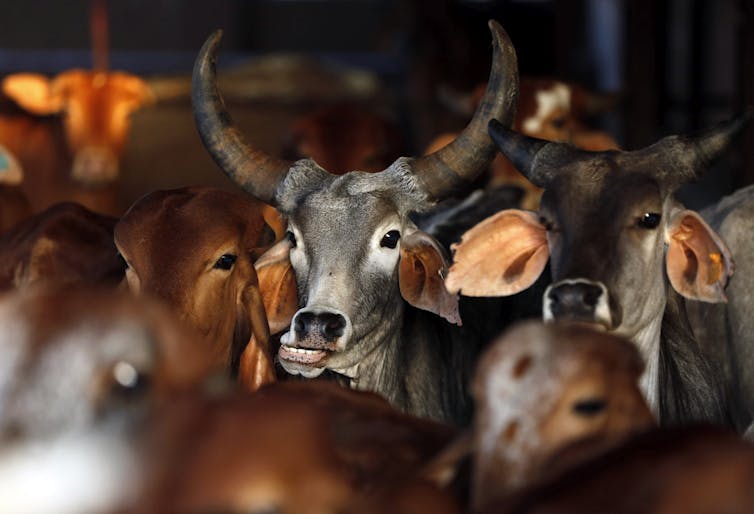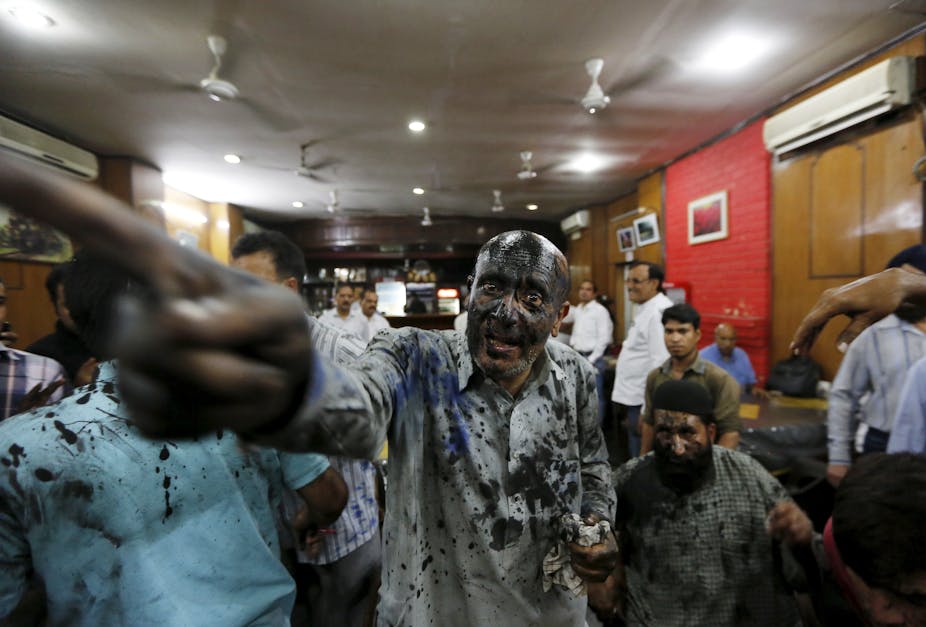As a child waiting for my gum in the local corner shop in Varanasi, India, I would stare at a large print hanging on the wall. The print in question was a picture of a generously proportioned cow with the head and bust of a woman. Growing up, I learned that it was the image of Kamadhenu – a Hindu goddess fabled for providing bounties to her worshippers.
In the anthropomorphic world of Hinduism, all cows descend from this “divine bovine”. What is more: more than a million Hindu deities reside in the cow’s body. So it falls upon the devout Hindu not only to worship the humble cow – but also perform their sacred duty by protecting it. This explains the baffling – to tourists, at least – Indian curiosity of cows standing listlessly in the middle of busy motorways without any harm coming to them.
But in India, where the slaughter of cows and sale of beef is restricted in 24 of the country’s 29 states, that sacred duty has taken a violent new turn. Hindu lynch mobs are taking to the streets. Their target: Muslims. Unlike their Hindu counterparts, Muslims do not associate cows with sacredness, and they eat beef. This does not gel well with some right-wing Hindus who wish to punish Muslims for their perceived profanity.
In late September, a Muslim man was murdered in New Delhi by a lynch mob on suspicion of killing and eating a calf. Shortly afterwards, a lorry driver in the disputed region of Kashmir was petrol bombed as the mob suspected him of ferrying cattle to be slaughtered in another province. And on October 19, Hindu activists smeared black ink and engine oil on the face of a Kashmiri lawmaker in New Delhi over allegations he held a “beef party”.
Skirmishes between protesters against the killings and police have erupted.
Double standards
Several hard realities are overlooked by these violent Hindu radicals. The average Indian Muslim doesn’t eat beef because of some religious prerequisite, as many die-hard Hindus would have us believe. Instead, the decision to eat it very often boils down to economics. In India, beef is, and has always been, cheaper than any other meat (chicken, goat or lamb). Kilogram for kilogram, it is even cheaper than potatoes in some places. For poor Muslims living on the economic margins, beef is the only source of a wholesome meal.
There are also Hindus who eat beef for the same economic reasons. Poverty-stricken and living outside the Hindu caste hierarchy, they don’t pay much attention to the religious prohibitions against killing cows and eating beef. And yet radical Hindus don’t complain about them.

Religious communities have often bent sacred rules to suit their own needs. European Christian medieval rulers regularly “allowed” Jews to remain in their kingdoms as money lenders, a forbidden occupation for Christians – and then taxed them heavily for it. Similarly, in the past, Tibetan Buddhists did not kill animals but happily employed butchers from other religions to do it for them. Hindus, in India, do not kill the oxen or bullocks but sell them to Muslim traders at the end of their working life, knowing full well that these miserable animals will end up in slaughter houses for their meat and hide.
Then there is the trade in other bovines. India, for example, is the largest exporter of buffalo meat and hide. In the Hindu pantheon, mahish – the humble buffalo – is a handmaiden of demonic forces and enjoys no religious protection. The cow, meanwhile, is an altogether different case. Harm it and you are harming Hinduism by proxy. To some orthodox radical Hindus, this is a crime worthy of violent retribution.
The politics of the divine bovine
This row over the holy cow is neither new nor likely to go away. During British rule, Hindus and Muslims regularly fought over cow protection – and there have been several bouts of communal rioting over the holy cow since. What is particularly worrying about the current violent outbreak is the growing militancy of some Hindus who are intent on targeting Muslims. To its critics, this militancy receives its succour from the ruling nationalist Bharatiya Janata Party’s pro-cow ideology.
There have been condemnations and denouncements of these actions and events by leaders in India, including the prime minister Narendra Modi. But there does not seem to be an ebb in this gathering Hindu maelstrom.
The Bulgarian writer Elias Canetti’s work Crowds and Power is an excellent tool to better understand the ongoing Hindu mob psyche. The mob is a crowd overwhelmed by a distorted belief. Rather than recognising itself as the cause of societal problems, the mob feels that it is a liberating force that Hindus can pin their faith on.
Unless the ruling leadership puts a brake on this mob frenzy and denounces its spurious ideology, civic life in India is likely to spiral into further anarchy.

